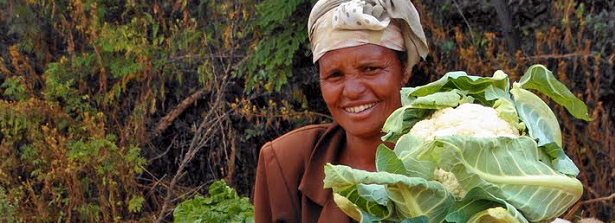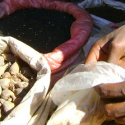Follow the Food workshop at African Landscape Dialogue on Businesses in the Landscape

From March 6 to 9, 2017, the GCP-2 Follow the Food team (Solidaridad, Fair & Sustainable and researchers from Utrecht University and Mary’s University college) participated in the “African Landscape Dialogue”, in Addis Ababa. This conference brought together more than 140 leaders working across Africa and around to exchange, discuss and finally improve the practice of integrated landscape management.1 The conference programme was organized around a number of core themes: Business, Finance, Multistakeholder collaboration, Enabling Policies and Capacity Building. Below some interesting findings for the Follow the Food project are described.
“Agribusiness in Landscapes” workshop
As part of the Dialogue, the Follow the Food team hosted a working session on the topic of “Agribusiness in Landscapes”. It focused on companies‘ impacts on land and water use as well as on local food security. Representatives of five Ethiopian based agribusiness companies in the field of horticulture and fish farming shared their experience about the different challenges, they face in the area where their company is located.
The aim of the session was to clarify what companies consider as their leverage and sphere of influence. What enables them to act? And what are the bottlenecks that hamper them to make improvements towards more sustainable practices?
Two essential landscape ingredients
The five companies present were all hampered by several ‘landscape level challenges’. The Ethiopian government fails to provide basic infrastructure such as electricity, water, telecom and internet, that is essential for daily operations. Problems with water management are widely shared. The companies deal with either flooding or scarcity. This despite the fact that solutions are at hand, for example rainwater harvesting, improvement of drainage canals and the creation of water collection to deal with the excess water. Also water reservoirs and groundwater pumps could be developed for water scare areas. Yet, problems remain unsolved. The reason is that this kind of infrastructure development requires government permission and support, which delays or complicates action on the ground.
Companies also experience a disconnect between policies set at national government and dissemination at the level of the local government. Additionally companies who are starting something new, for example in the aquaculture sector in Ethiopia, experience that existing government policy is not accommodating. Moreover there is an imbalance in conditions set for national investors and international investors, for example foreign companies benefit more from tax exemptions.
Local capacity was mentioned as another challenge. Companies are willing to hire people from the surrounding communities. However due to lacking expertise and skills of those community members they are often forced to hire people from other localities. This might cause tensions.
So, the five entrepreneurs find themselves in a complex situation. On the one hand communities and even the government expect them to solve landscape challenges. At the same time they perceive the initiatives from private sector with suspicion. As such a lack of buy in from other landscape stakeholders make it difficult to achieve successes.
The workshop made clear that in order for companies to positively contribute two landscape development two ingredients are essential:
- Interaction with local communities to identify their needs and desires;
- Support and participation from both national and local government.
Workshop reflections of Follow the Food team members
Senait Getahun (PhD Utrecht University) noted that a number of the companies are more than willing to contribute positively to landscape level challenges they are facing. However the lack of support from the government side, limits them from doing so. She adds: ‘In the dialogue, I noticed that many organizations (especially NGOs) are trying to create a healthy landscape which leads to sustainable development but they are doing this almost solely, as a single organization. This limits the scale of impact they could create. So rather than acting individually, pulling resources and setting common goals would help in materializing the changes we want to see.
Katie Minderhoud (Solidaridad) thinks there is a misconception around the role of companies when it comes to landscape challenges and sustainable development: ‘Often there is a one sided view on how company operations harm the environment or become a source of social conflict. Or there is an underlying assumption that companies always have the means and influence to act, as one of the participants remarked: “Companies are held responsible for a lot of issues because they have money, but not all problems are solved with money”. Katie says: ‘I was really inspired by the companies who attended our meeting, and got me thinking that agribusiness can in fact be leaders in landscape solutions. During the discussion we got to see a different picture, at least for the participating companies, It became clear how lack of governance and lack of collaboration in the landscape affected their business. In fact these companies are actively looking for ways to respond to the challenges at hand. Katie is of opinion that business opportunities and agricultural development in the landscape at large depend on successful collaboration between landscape and stakeholders.
James Wangu (PhD Utrecht University) confirms that the landscape approach is useful for analyzing the roles and responsibilities of private and public actors but notes that: ‘From an inclusive business approach, landscapes improvement could only be explored in areas where there is a ‘business case’ for an investor. Some, if not all, of the most degraded, unproductive landscapes do not have a business case for investments. Private sector assumes this is the role of the government (public sector); but in many developing countries, government tend not to take up its role effectively. Who takes action in these landscapes if NGO’s increasingly link up with private sector actors?
Project follow up
One of the outputs of the Follow the Food program is the development of a tool that assists companies gaining insights in their impact on their environment. The insights gained in the workshop serve as input for the tool development.
Footnotes
- 1. The conference was hosted by the Horn of Africa Regional Environment Center & Network (HOAREC&N) at their meeting place in the Gullele Botanic Garden in Addis Ababa, Ethiopia. Organizing partners include HOAREC&N, the African Model Forest Network, EcoAgriculture Partners, NEPAD/TerrAfrica, Solidaridad Network, the Water and Land Resources Center (WLRC) and the World Resources Institute.






